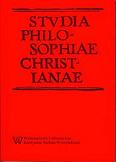Aporia poznania jako transcendentalny fundament świadomości
Aporia of cognition as the transcendental foundation of consciousness
Author(s): Marcin FurmanSubject(s): Philosophy
Published by: Wydawnictwo Naukowe Uniwersytetu Kardynała Stefana Wyszyńskiego w Warszawie
Keywords: aporia; epistemology; phenomenology; Husserl Edmund; ontology; subject; cognition; consciousness; transcendentalism
Summary/Abstract: Reflection of consciousness divides reality. On the one side there is the subject, and on the other ? the object. However, the recognizing subject appears to be a problematic being because it implies in himself a being different from himself. According to Merleau-Ponty?s phenomenology, the position of the subject cannot be described in another way than by the aporia inherent to his transcendental nature. Although the body gives a feeling of a symbiosis of ?empirical myself? and the world, but it cannot constitute cognition. Merleau-Ponty brings back the world lost by Husserl in his phenomenological reduction, but looses cognition which essence is the subject?s perspective. Cognition can be described only from the perspective of the subject. Pimordiality of the thing it itself is imperceptible in cognition. The object of cognition exists only on the basis of the inter-subjective relation therefore its understanding as the thing in itself is aporetic. It can be seen in consciousness which defines the cognitive possibilities of the subject and shows at the same time that he usually tries to exceed them.
Journal: Studia Philosophiae Christianae
- Issue Year: 45/2009
- Issue No: 2
- Page Range: 119-127
- Page Count: 9
- Language: Polish

